 Petzlover
Petzlover Cardigan Welsh Corgi is originated from United Kingdom but Lithuanian Hound is originated from Lithuania. Cardigan Welsh Corgi may grow 28 cm / 11 inches shorter than Lithuanian Hound. Cardigan Welsh Corgi may weigh 18 kg / 39 pounds lesser than Lithuanian Hound. Both Cardigan Welsh Corgi and Lithuanian Hound has almost same life span. Cardigan Welsh Corgi may have less litter size than Lithuanian Hound. Both Cardigan Welsh Corgi and Lithuanian Hound requires Low Maintenance.
Cardigan Welsh Corgi is originated from United Kingdom but Lithuanian Hound is originated from Lithuania. Cardigan Welsh Corgi may grow 28 cm / 11 inches shorter than Lithuanian Hound. Cardigan Welsh Corgi may weigh 18 kg / 39 pounds lesser than Lithuanian Hound. Both Cardigan Welsh Corgi and Lithuanian Hound has almost same life span. Cardigan Welsh Corgi may have less litter size than Lithuanian Hound. Both Cardigan Welsh Corgi and Lithuanian Hound requires Low Maintenance.
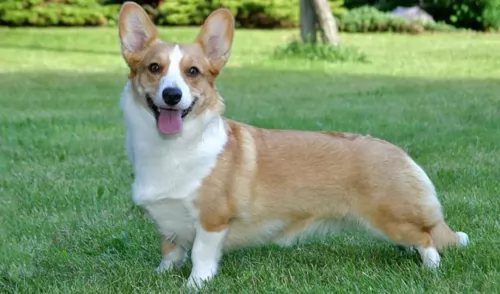 The Cardigan Welsh Corgi, named after Cardiganshire, Wales, is an ancient breed, brought to Wales by the Celts about 3,000 years ago.
The Cardigan Welsh Corgi, named after Cardiganshire, Wales, is an ancient breed, brought to Wales by the Celts about 3,000 years ago.
Small but tough, the Cardigan used to take part in cattle drives and his duties extended to protecting them at night.
The first pair of breeding Cardigans arrived in the United States in June 1931. The AKC granted full recognition to the breed four years later.The Cardi, as the breed is commonly called, was developed as an all-around farm dog in Wales. It is believed to be a descendant of the Pomeranian, Schipperkes, Keeshond and Swedish Valhund.
The Cardigan and the Pembroke Welsh corgis were separated officially into different breeds in the early 1930s. AKC recognition came in 1935.
 This attractive dog hails from Lithuania.This is an old dog breed that has been used as a hunting dog.
This attractive dog hails from Lithuania.This is an old dog breed that has been used as a hunting dog.
It is believed that this dog dates way back to the 16th century and that it was developed from the mixing of hound breeds – Bloodhounds, Beagles, Polish Hounds and Russian Hounds.
The numbers of the dogs decreased and in the late 1970s, the Lithuanian Cytological Council developed a kennel facility for restoring Lithuanian Hound numbers, and a standard was also written. This breed is rare and is not usually found outside the Republic of Lithuania.
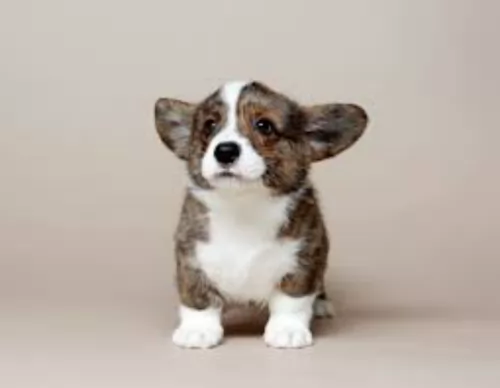 The long-shaped Cardiganshire Welsh Corgi is also nicknamed the ‘yard-long dog’ in Wales. Don’t be fooled by this low-to-the-ground dog, because when you look at him he isn’t a small dog at all, looking almost like a German shepherd with short legs, upright ears and a long, bushy tail.This is unlike the Pembroke Welsh Corgi whose tail is traditionally docked.
The long-shaped Cardiganshire Welsh Corgi is also nicknamed the ‘yard-long dog’ in Wales. Don’t be fooled by this low-to-the-ground dog, because when you look at him he isn’t a small dog at all, looking almost like a German shepherd with short legs, upright ears and a long, bushy tail.This is unlike the Pembroke Welsh Corgi whose tail is traditionally docked.
The Cardi stands around 270 to 330mm tall at the withers and weighs between 11 to 17kg. With those short legs he can gather up quite a speed as well. The dog has a double coat in fawn, red, black and with the outer coat being of medium length and quite harsh to the touch. You can also find some white on the neck, chest as well as on the legs.
The Cardigan Welsh Corgi is full of spirit and makes a fantastic companion for someone looking for a fun-loving, devoted friend. He is an easy going dog, making a wonderful pet, while being reserved with strangers. He isn’t a tall dog but he will guard the family too. He is good with children in the family and even with other pets, provided he is trained and socialized.
 The Lithuanian Hound is a medium-sized dog which stands at between 53 - 61 cm in height and weighs between 27 to 32kg.
The Lithuanian Hound is a medium-sized dog which stands at between 53 - 61 cm in height and weighs between 27 to 32kg.
He is a well proportioned, sturdy dog, heavily boned and muscular with straight, strong legs. The coat of the dog is short, smooth and essentially black with some tan markings. He has a large head, bright brown eyes, black nose, deep, broad chest and long, floppy ears with rounded tips. The tail of the dog is long and held low.
The attractive Lithuanian Hound is a sighthound known for his hunting skills which he does with great determination and stamina.
He loves going on the hunt and forms a strong bond with his hunting handler, being reserved with people he doesn’t know. Lithuanian Hounds are generally easy to train and are eager to please. Training and socialization will be easy with a dog like this as he is intelligent and keen to please.They respond well to an owner who is confident, fair, patient and consistent.
His attachment to the family makes him a good watchdog too. After the hunt, he becomes an amicable, friendly, loving dog, loving to spend a quiet evening with his human family. He is energetic and doesn’t take too kindly to sitting around for long periods. He loves to be on the go and will require a good deal of vigorous exercise.
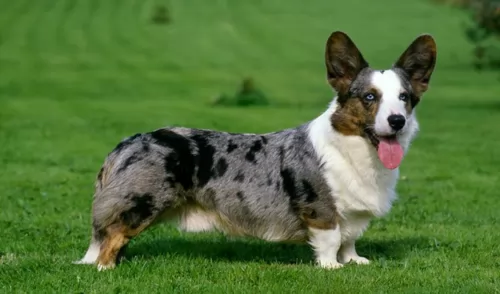 The Cardigan Welsh Corgi is full of surprises and he has been a strong working job, being quick and agile around cattle. He is good at everything and with training and socialization he is going to make an excellent pet.
The Cardigan Welsh Corgi is full of surprises and he has been a strong working job, being quick and agile around cattle. He is good at everything and with training and socialization he is going to make an excellent pet.
They are good with children and other pets and he makes an excellent guard dog as well. He is strong willed and feisty but he wants to please his owner. With a dog like this in your life, you’re going to have a faithful and loving friend who knows how to entertain you as well with his antics.
 The Lithuanian Hound has always been a dog used for hunting, so he wants to belong to a family where hunting is still practiced or where there is a large garden.
The Lithuanian Hound has always been a dog used for hunting, so he wants to belong to a family where hunting is still practiced or where there is a large garden.
He is smart and easy to train, and what’s more he’s a healthy, robust, low maintenance dog. He’s an amicable dog too, calm, independent and confident, and will make a splendid companion to his human family. He gets on well with children and is willing to share his space with other dogs too.
By choosing the Lithuanian Hound, you’re allowing a wonderful canine friend into your home and heart.
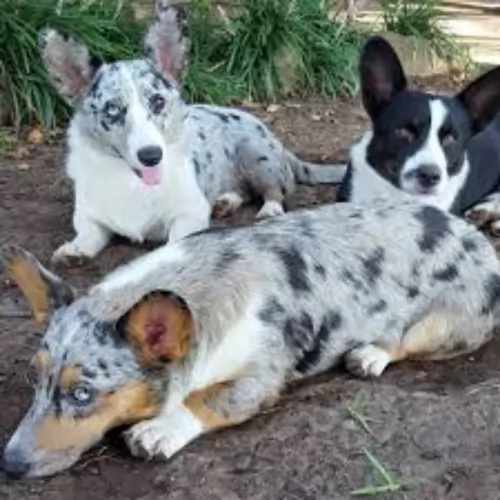 The Cardigan Welsh Corgi is a generally healthy breed with an average lifespan of 12-15 years. Like all dogs, they will have some health concerns, and recognizing the symptoms of some common dog illnesses can spare your pet.
The Cardigan Welsh Corgi is a generally healthy breed with an average lifespan of 12-15 years. Like all dogs, they will have some health concerns, and recognizing the symptoms of some common dog illnesses can spare your pet.
This is a debilitating genetic joint condition that can affects any dog really. It occurs when the hind leg joint isn’t held properly by the hip socket. Bone is worn away and your dog can experience severe pain.
Unfortunately this is a common skeletal disorder and your pet will be reluctant to jump or play. Untreated, it can lead to arthritis and chronic pain, making him immobile. There are several types of treatments and you want to get your pet to the vet to relieve him of pain and discomfort.
This is a terrible disease for your pet because the rear legs can actually become paralyzed and your pet won’t be able to control their bowels. It is an inflammatory autoimmune disease where the dog’s immune system cells attack the spinal cord sheath. If your vet suspects Degenerative Myelopathy, a blood sample will be required. Sometimes the dog has to be mercifully euthanized. Sometimes people even turn to holistic treatments to avoid this and help their pet.
 Lithuanian Hounds can reach 12 – 14 years of age when they’re loved and well cared for. You won’t find many medical problems with this robust dog breed, but it pays to know some of the more common dog illnesses.
Lithuanian Hounds can reach 12 – 14 years of age when they’re loved and well cared for. You won’t find many medical problems with this robust dog breed, but it pays to know some of the more common dog illnesses.
This is a genetic condition that affects the hips and which can lead to painful arthritis. Dogs prone to hip and elbow dysplasia always benefit by avoiding obesity.
Deep chested dogs are more prone to Bloat, occurring when gas builds up in the stomach and can’t escape. This is a life threatening illness and immediate medical attention will be required.
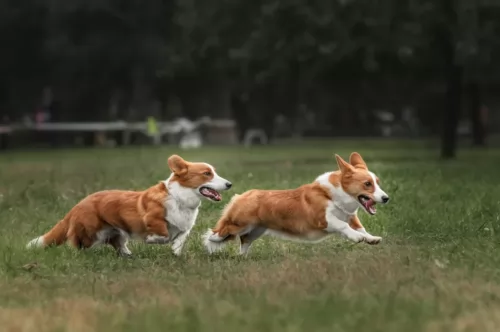 Cardigan Welsh corgis are active dogs and he is going to need daily exercise. He’ll love a walk with you and will show you how agile he is when you throw a ball for him
Cardigan Welsh corgis are active dogs and he is going to need daily exercise. He’ll love a walk with you and will show you how agile he is when you throw a ball for him
The Cardigan is a low maintenance dog. His thick double coat does shed quite a bit but nonetheless it is easy to maintain. Simply give it a good brush to remove loose hairs and to get rid of dirt. This brushing distributes the dogs natural oils and helps to keep the coat shiny and healthy.
 This energetic dog is going to want a lot of exercise as he has always been a hunting dog. While a long, brisk walk will be excellent for him, he will want more activity than that. He’ll want to be included in all your activities – walks, hikes, camping trips and swimming.
This energetic dog is going to want a lot of exercise as he has always been a hunting dog. While a long, brisk walk will be excellent for him, he will want more activity than that. He’ll want to be included in all your activities – walks, hikes, camping trips and swimming.
A big positive with the beautiful, sleek Lithuanian Hound is that he is looked upon as a low maintenance dog. The short coat will require a good brush down twice a week.
He sheds a couple of times during the year. He’s the kind of dog who thrives on these grooming sessions and it’s a time to check him over for ticks and fleas as well as for odd lumps.
Look inside his ears too, particularly since he is a floppy eared dog. Open his mouth too and keep his teeth brushed and clean. There is special canine toothpaste and toothbrush for this purpose. Never try to use human toothpaste as it can be toxic for your dog.
There are a number of things to consider when it comes to feeding your dog, but it goes without saying that the best, most nutritious food will ensure health and longevity.
If you feed your pet commercially manufactured pet food, use the feeding guidelines found on the packaging labelling. With any new food types you give your dog, keep an eye on him for reactions.
Your dog’s metabolism and energy levels as well as his age will determine how much to feed him.
There are many excellent dog foods available – choose an excellent one and make sure to feed your dog some tasty, nutritious home-made food too.
You can’t go wrong with some cooked chicken, brown rice or pasta and some raw and cooked vegetables. Chop up and add to his dry kibble from time to time and he’ll be happy and healthy. Raw meat is expensive but try and include some every now and then as it contributes to allergy-free skins, bright eyes, shiny coats, wet noses and wagging tails.